Jess' story:
How this new mom is using her talents, experience, and curiosity to help other women reclaim their careers (including her own)
One year ago, Jess realized she needed a big change in her career. Feeling stagnant in her more traditional corporate role, she turned to her LinkedIn network and asked for a favor: introductions to women who had made bold career pivots.
What followed was beyond her expectations. She connected with women around the US who had thrown everything up in the air to start anew for various reasons.
She was curious: what could she learn from these women?
So she embarked on a project to find out. She started with dozens of interviews, trying to identify and codify patterns, tips, tricks — perhaps even a checklist.
Meanwhile, she had her first child and switched her day job to part-time so that she could use more of her energy turning the interview project into a book and consulting business.
What she found was that, of course, there is no standard playbook or checklist for how to pivot your career. But at the same time, she did find common themes among the women she interviewed.
We asked Jess more about her own parental leave experience as well as her #ReclaimYourCareer research to show just how relatable this season of life can be. Keep reading to learn more about her story.
Read our Q&A with Jess where we dig into her findings, lessons learned and backstory of #reclaimyourcareer. Dive deeper below.

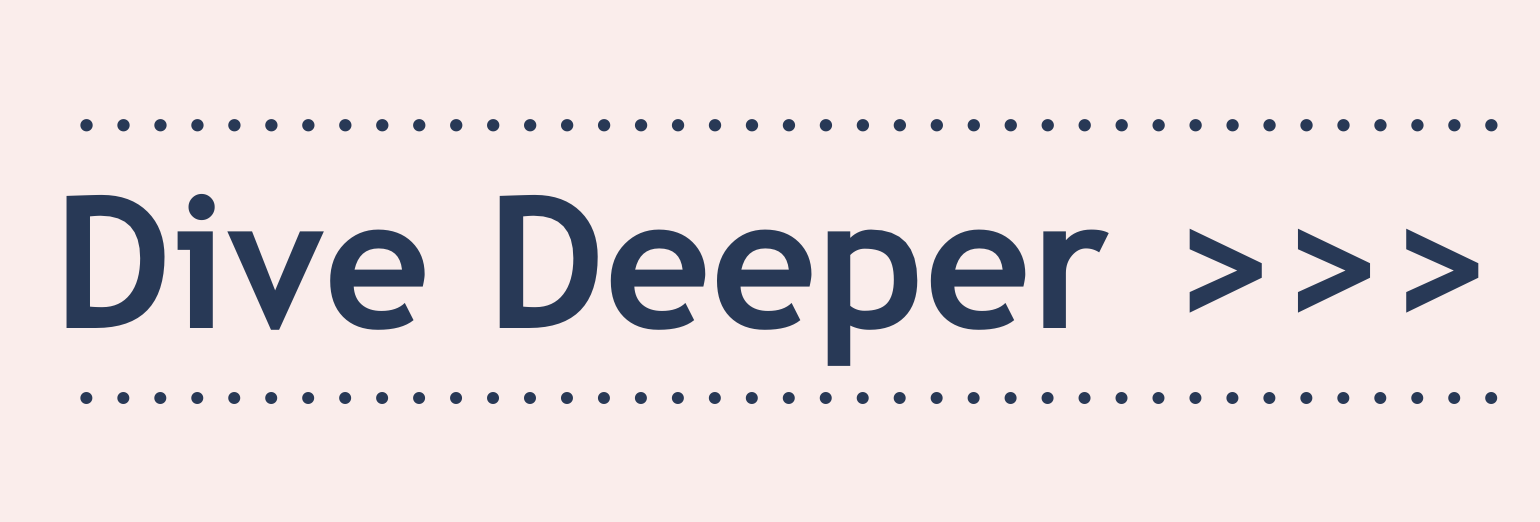
A Q&A with Jess: #ReclaimYourCareer project
Q: What’s your project, Reclaim Your Career, about?
A: Reclaim Your Career covers the topic of career pivoting and career fulfillment for women. We know that in today’s modern career economy, pivoting is the new normal. Gone are the days of working at one company for decades. We also know that a disproportionate amount of women feel disillusioned and burnt out by their current career path.
However, few people are talking about career pivoting at the intersection of gender. This is surprising because gender informs every step of a career pivot — from why, to when, to how. My writing (a series of interviews, and a book in the works) shares the stories of women who have made brave career pivots.
Those stories inspire women to make their own pivot toward a more authentic and fulfilling career. They help women grapple with the emotions holding them back — fear, guilt, insecurity — and unlock what they’ve always had the capacity to do: break free from a traditional narrative of success and start writing your own career story that’s right for you.
Q: Why are you interested in this topic?
A: Well, women and career has been a part of my story since I was little. My mom was a first-generation college graduate, and I was raised to take pride in her career. As a result, career achievement became a big part of my identity. When I entered the corporate world, every choice I made was based on a traditional “success” narrative: put your head down, climb the ladder, and make money quickly. The problem? I rarely enjoyed my work. I knew that work is not always easy, but after more than a decade, I questioned if it was normal to feel so disconnected. No matter the change I made to my career, I still felt ambivalent and dissatisfied.
Realizing that the traditional narrative didn’t fit me and I might need to make a major change, I started talking to other women who made big career pivots. In that process, I discovered that my story—building a career, doing everything “right”, but waking up lost—is not unique. A few conversations turned into dozens of interviews and valuable research on why, when, and how to pivot.
So, I became a self-learned expert when it comes to women finding their authentic career path. I’ve lived the story.
Q: How has motherhood sparked this project?
A: Becoming a new mom a year ago gave me the courage to do something with my research and begin writing. When I look at my daughter and think about what I want for her, I really want her to feel comfortable in her own skin, to be who she wants to be. But when I looked in the mirror, and it came to my career, I realized I wasn’t who I wanted to be. It’s why I went on a journey to learn from other women and now want to share that knowledge with others. My goal is to start a broader conversation to help women unlock the courage to take a risk in doing things differently—the courage I wish I had earlier in my career.
Q: How can others follow along with this project and book launch?
A: Go to reclaimyourcareer.co for more info, stories, and to sign up for updates.
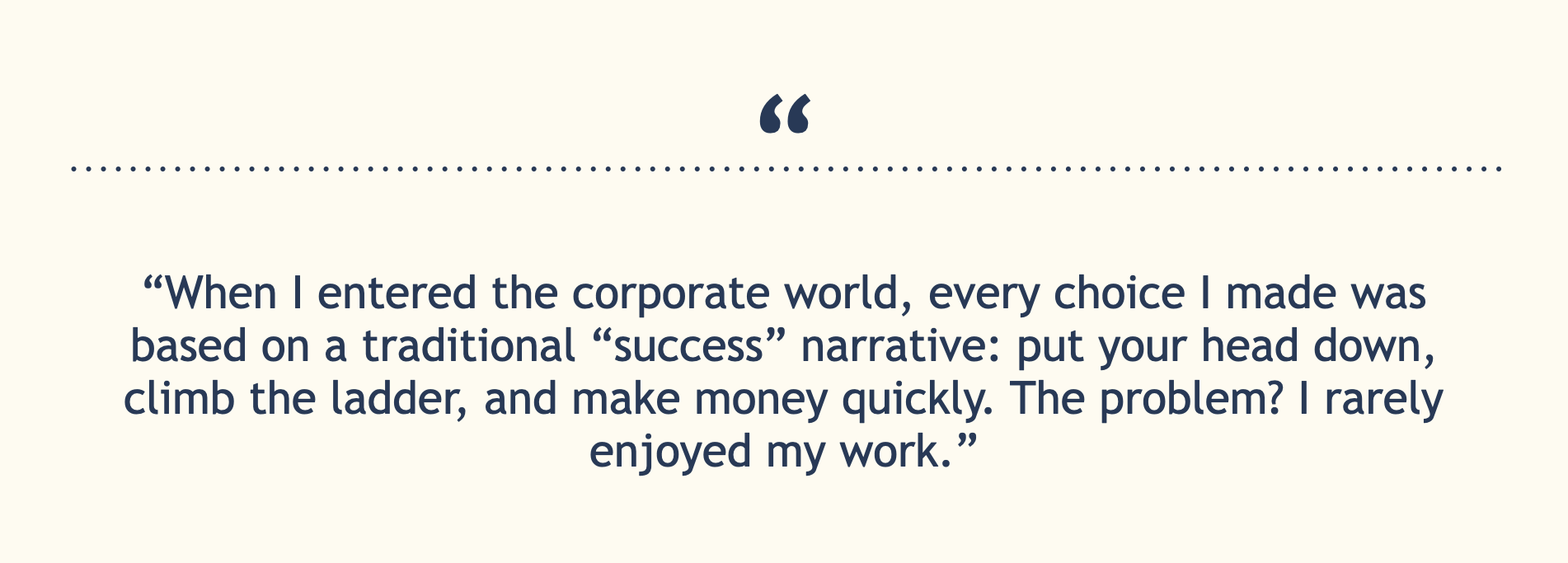
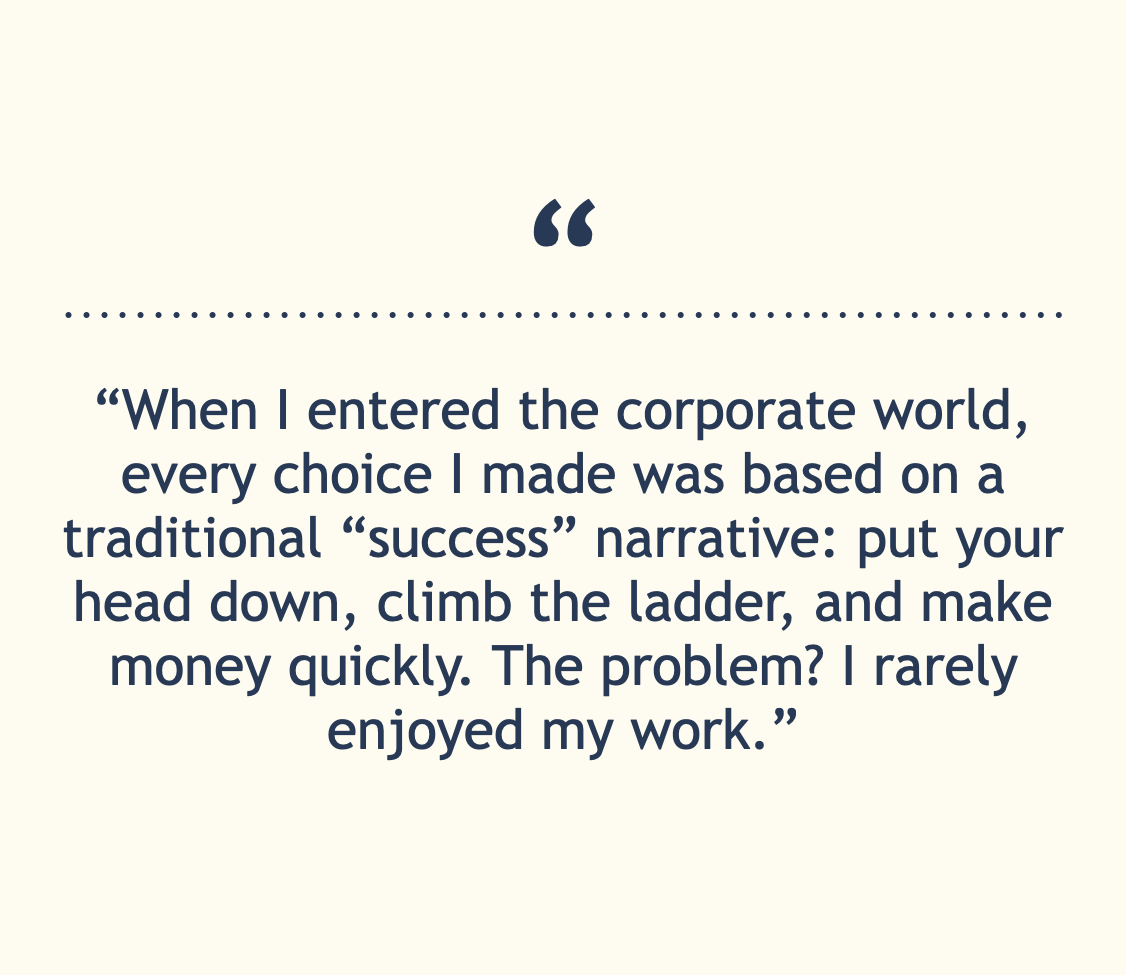
Common themes emerging from Jess’s conversations with career changers
Jess has interviewed dozens of women for her research and writing and has been surprised by the common themes throughout the process.
“Going into my first interviews with women, I thought the stories would help me distill tactical tips and tricks for women to pivot. ‘Do X, try Y.’ A Ten Commandments for women pivoting. I was very wrong. I realized that women don’t need another checklist. Instead, they need to see stories that inspire them and help them understand the big emotions and big themes holding them back. (rather than the tactical how-to). The big themes that cut across all women are centered on the right mindset and emotions to fuel a big career change.”
We asked Jess to share these themes in the hopes that other working parents can identify with these challenges and learn how to overcome them.
The following are her findings:
- Aligning your career to your interests is not indulgent -- it’s strategic. What is your inner voice telling you when it comes to your career? Is there a dream you’ve put off chasing? Something you loved to do as a child but never incorporated into your career? Following your gut and your interests can sound fluffy - it’s not. When you align your career with an authentic interest or purpose, you will perform better. Instead of “faking it until you make it,” now you bring a competitive advantage that you can sustain long-term.
- Your definition of success should be unique to you. The global pandemic has shown us there is so much more to work than a job title and a paycheck. Women who are most satisfied after pivoting have clearly-defined career goals personal to them - whether it be flexible hours, competitive compensation, diversity in leadership, mission-driven work, or whatever else matters. They use their pivot as an opportunity to pause and define, with intention, what success looks like for them. They get specific. And most importantly, they stay laser focused on their definition of success and mute the competing voices around them.
- The most successful career changers embrace a success mindset and leave behind a failure mindset. The most successful career changers all had one thing in common - they bet on themselves. During their career change, they shifted from wondering, what if this wildly fails?, to begin wondering, what if this wildly succeeds? I cannot overstate how much this came up in my conversations! One career coach I interviewed says this single factor tells her, within minutes, whether or not a client will succeed in pivoting. The good news is that this mindset did not come easily to everyone, it’s a mindset that can be learned and reinforced with practice. Women want to wait until every box is checked — but the best career changers move before they’re ready. When you pivot, there is always an experience gap between where you are and where you want to go. However, that gap is always smaller than you think. The most successful women were able to pull the threads from their past work experience to their future ambition. While women have the tendency to wait until they meet all of the requirements to go for the job, if you check all of the boxes, you are overqualified.
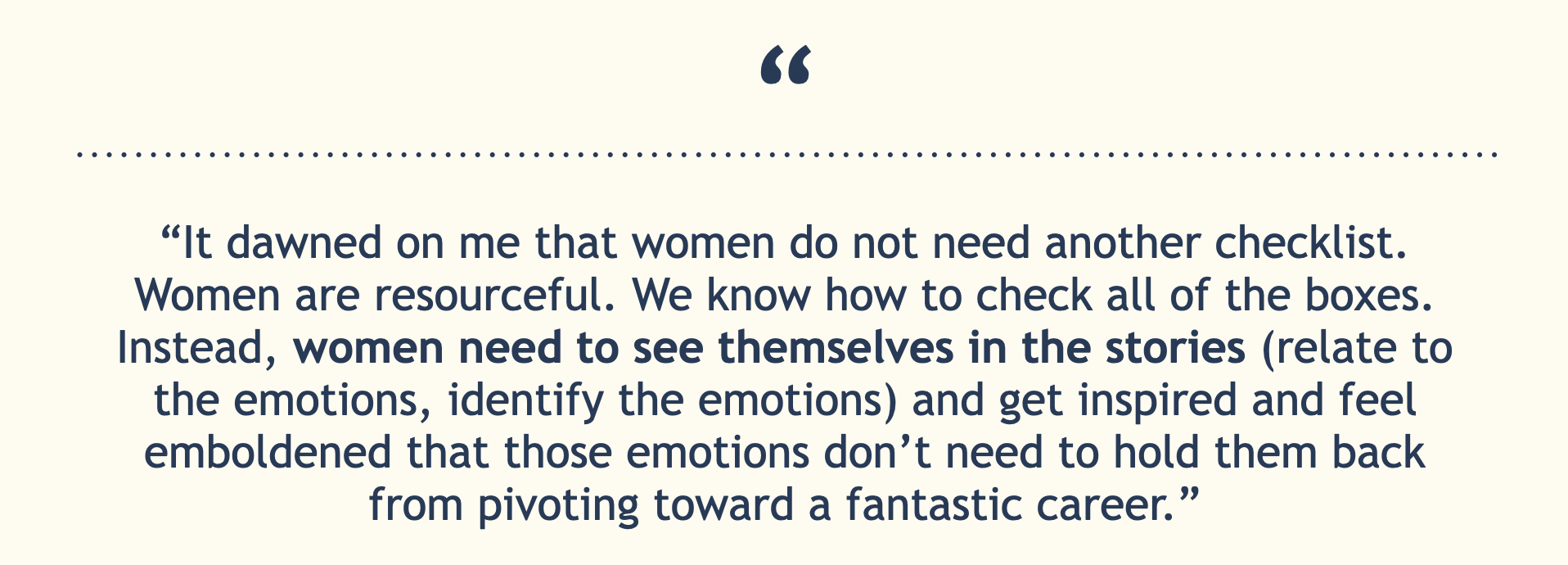
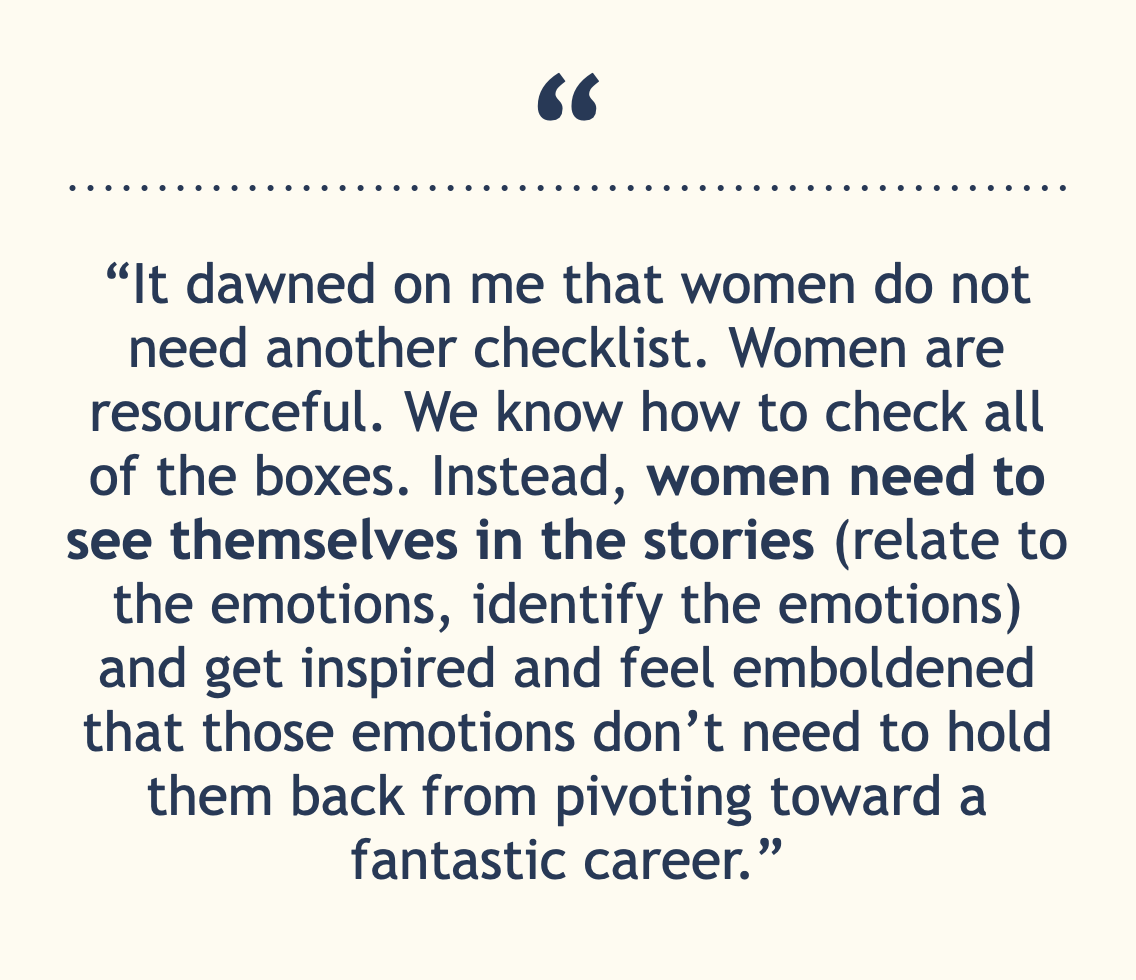
Jess' working parent cheat sheet
Jess’s parental leave: 14 weeks
Jess’s ideal parental leave length: 16 weeks
Most important aspect of returning to work: Setting up reliable childcare
Missed opportunity upon return: Advocating for a ramp-up period
Recommendations:
- Cooking or meal planning: Cook in batches and freeze!
- Fitness: Short 20-minute workouts can go a long way
- Self-care and spirituality: To fully relax, I’ve learned that I need to be physically apart from my daughter. Being in the room next door or upstairs isn’t enough. It’s much more restorative if I can get outside for a walk, or spend a night or two away and let my husband take care of her.
- Traveling with kids: Plan long drives with nap times. And if you can, pack in advance.
- Streamlining the morning routine: Keep it consistent. Over time, consistency speeds up your routine and reduces the chance of something going off the tracks.
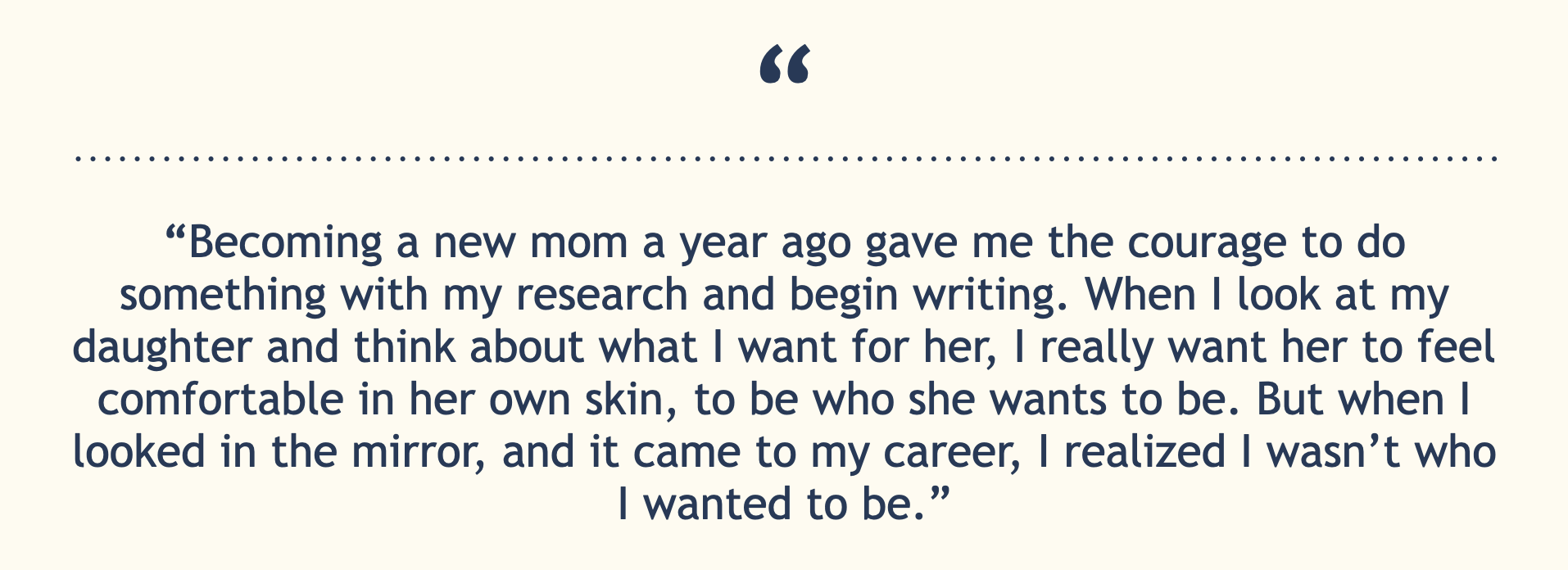
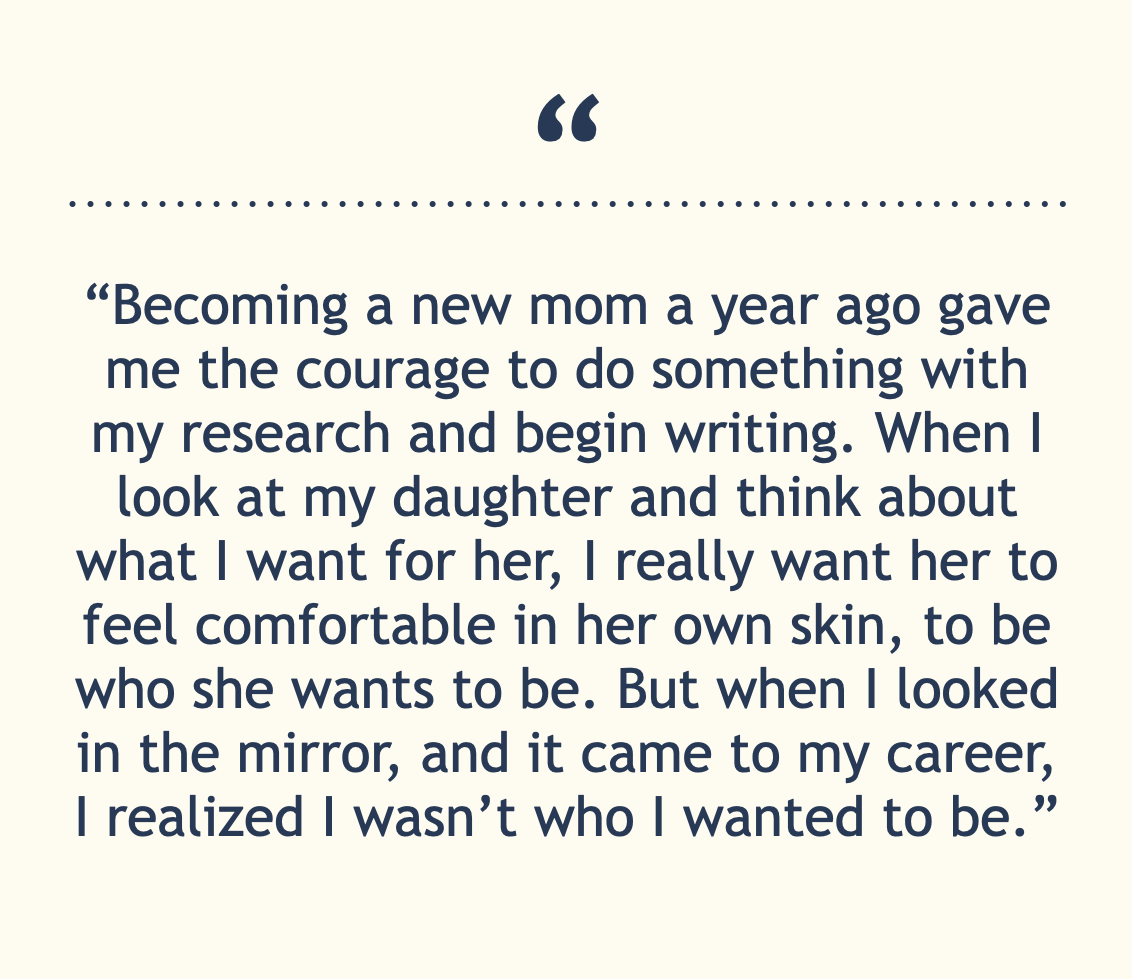
Want to read more of these stories?
We'll send them straight to your inbox every time we publish a new profile (two times per month).
Send them to me!

